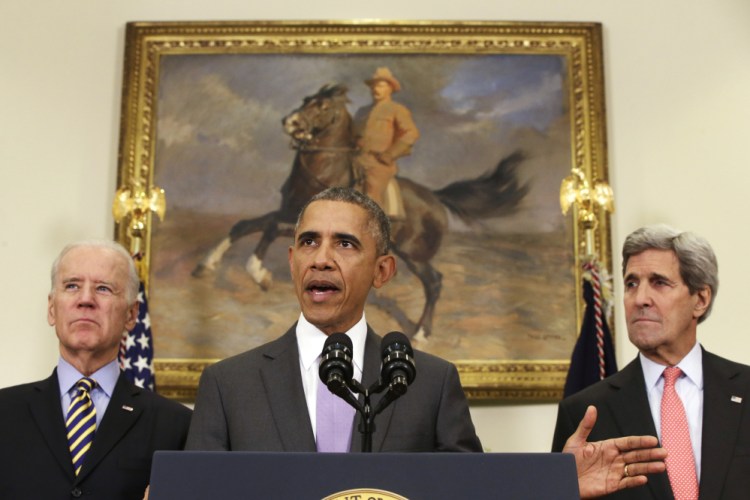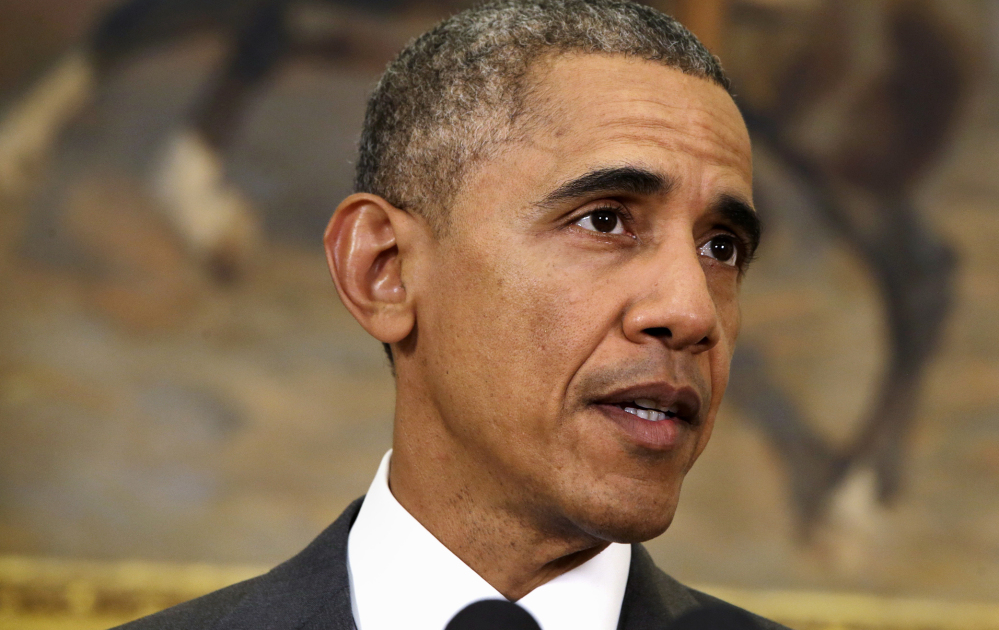WASHINGTON — President Obama’s formal request Wednesday for authority to use military force against the Islamic State set the stage for the first broad congressional debate over the administration’s strategy in Syria and Iraq.
Looking toward what could be months of hearings and significant changes in White House language before a final vote, Republicans seeking a broader authority, and Democrats hoping to narrow the president’s war options, staked out widely divergent positions.
House Speaker John Boehner, R-Ohio, said Obama, is also “going to have to go out and make his case to the American people. The delivery of this authorization is the beginning of a legislative process.”
The requested Authorization for the Use of Military Force, or AUMF, would permit ongoing airstrikes and U.S. military training for local ground forces in Iraq and Syria for the next three years, while prohibiting “enduring offensive ground combat operations.” It includes no geographic limitations on a possible extension of the war beyond those two countries in pursuit of the Islamic State and “associated persons or forces.”
“It is not the authorization of another ground war, like Afghanistan or Iraq,” Obama said in a White House appearance. But he said it would give him “the flexibility we need for unforeseen circumstances,” including ground deployment of Special Operations forces for rescue missions and unspecified assistance to local forces.
‘DANGEROUS, COMPLEX THREAT’
Many Democrats called that restriction too vague. “It’s a very broad grant of authority … that leaves wide open the possibility of real engagement of U.S. combat forces on the ground in Iraq and Syria,” said Rep. Chris Van Hollen, D-Md.
Others said the authority did not go far enough. “The president must articulate and implement a comprehensive strategy that gives our military experts and commanders the agility and authority they need to successfully confront this increasingly dangerous and complex threat,” said Rep. Michael Turner, R-Ohio. “Today’s request by the president does not meet that criteria.”
Senior Republicans, including Senate Armed Services Chairman John McCain of Arizona, whose committee will consider the bill, have said that ground forces might be needed and that nothing should be ruled out in confronting the dire threat posed by the Islamic State. In a statement late Wednesday, McCain expressed “deep concerns” about what he called Obama’s “narrow definition of strategy” and called the proposal a “recipe for failure.”
McCain and Foreign Relations Committee Chairman Sen. Bob Corker, R-Tenn., met with Republican senators Wednesday to discuss next steps.
OPTIMISTIC ABOUT SUPPORT
Obama, flanked at a White House appearance by Vice President Joe Biden and his secretaries of state and defense, said his strategy of using U.S. and coalition airstrikes against the militants, and bolstering local ground forces to push them back, was succeeding.
“This is a difficult mission, and it will remain difficult for some time,” he said. “But our coalition is on the offensive, ISIL is on the defensive, and ISIL is going to lose.” ISIL is an acronym for the Islamic State.
The new authorization would also repeal the 2002 AUMF under which President George W. Bush invaded Iraq, but it would leave in place the 2001 authorization against the al-Qaida perpetrators of the Sept. 11, 2001, attacks. Both have been cited by the Obama administration as legal justification for its military action in Iraq and Syria.
Obama has said that the war is likely to continue beyond his administration. Including a three-year limitation on the authorization was “not a timetable,” he said Wednesday. “It is not announcing that the mission is completed at any given period. What it is saying is that Congress should revisit the issue at the beginning of the next president’s term. It’s conceivable that the mission is completed earlier. It’s conceivable that after deliberation, debate and evaluation, that there are additional tasks to be carried out in this area.”
The president did not rule out changes in his proposed language. “I believe this resolution can grow even stronger with the thoughtful and dignified debate that this moment demands,” he said. “I’m optimistic that it can win strong bipartisan support, and that we can show our troops and the world that Americans are united in this mission.”
Democratic proponents of early passage expressed concern that the legislation could be drawn into an extended debate over Obama’s overall foreign policy.
“I’m hoping it takes weeks but not months,” said Rep. Adam Schiff, D-Calif., who last year introduced his own authorization bill. “I don’t think either the president or Congress are going to want this hanging out there indefinitely or dying the death of a thousand cuts. Add that to the fact that we’ve been at war already for a year and a half.
“This is not going to be a war strategy document,” Schiff said, “it’s going to be a checks and balances document that sets congressional limits on what we want our president to be doing.”
Send questions/comments to the editors.




Success. Please wait for the page to reload. If the page does not reload within 5 seconds, please refresh the page.
Enter your email and password to access comments.
Hi, to comment on stories you must . This profile is in addition to your subscription and website login.
Already have a commenting profile? .
Invalid username/password.
Please check your email to confirm and complete your registration.
Only subscribers are eligible to post comments. Please subscribe or login first for digital access. Here’s why.
Use the form below to reset your password. When you've submitted your account email, we will send an email with a reset code.